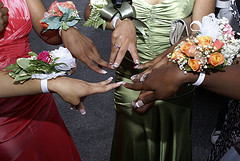Tag Archive: teen drowsy driving

Teens and Drowsy Driving
October 29, 2009
Does the morning alarm seem to come too early in the day? Do you catch yourself daydreaming or having trouble focusing throughout the day? Do you find yourself rubbing your eyes or yawning? You may be suffering from Sleep Deprivation.
Being sleep deprived has a cumulative effect. The National Sleep Foundation (NSF) recommends 8.5 to 9.5 hours of sleep for teens to be fully rested and notes that other professionals recommend higher amounts. The less sleep you have, the more deprived you are and it continues to add up during the week.
Reduced amounts of rest affect judgment, performance, information processing, emotions, and reaction time. All factors which are heavily relied upon for everyday functions and especially important when operating a vehicle. The National Highway Safety Transportation Association (NHSTA) estimates falling asleep at the wheel is responsible for at least 100,000 automobile crashes, 40,000 injuries, and 1,550 fatalities nationwide per year. They have identified young people as a high risk population for drowsy driving.
Teens typically have full schedules, academic and social pressures to balance. Their body clocks change during this developmental time, calling for them to stay up later at night and wanting to sleep in longer in the morning. When teens drive without sufficient amounts of sleep, they are even more vulnerable to the dangers teen drivers already face including:
- Distracted driving due to cell phones, texting, other passengers, adjusting music and eating or drinking
- Inexperience
- Impulsive behavior, including reckless driving, tailgating and speeding
- Lack of consistent seat belt use
- Reduced visibility at dawn, dusk or night
Other risks that increase drowsiness include:
- Colds, viruses and the flu
- Many prescription and over the counter medications
- Sleep apnea
- Alcohol consumption
NHSTA has identified late night, late afternoon and morning hours between six and eight a.m. as the hours teens are most tired and in the most jeopardy. Getting enough rest and avoiding high risk behaviors at specific times help to prevent drowsy driving. Also consider asking a passenger to stay alert and share the driving responsibility.
How can you over come driving drowsy? The National Sleep Foundation has the following suggestions:
- Watch for the warning signs of fatigue
- Stop driving-pull off at the next exit, rest area or find a place to sleep for the night
- Take a nap-find a safe place to take a 15 to 20-minute nap
- Consume caffeine-the equivalent of 2 cups of coffee can increase alertness for several hours
- Try consuming caffeine before taking a short
Be safe and get some rest.
Learn more at the National Sleep Foundation (NSF). The NSF has established November 2-8 as Drowsy Driving Prevention Week.

A Pre-Prom Plan for Avoiding Alcohol
May 6, 2009
Prom is an exciting event in the lives of many teens, who are preoccupied with buying dresses or renting tuxedos, selecting corsages and boutonnieres, choosing formal hairstyles, and making post-prom plans. But prom can also be a dangerous time for teens who choose to drink alcohol or ride with other teens who drink. You must plan ahead in order to ensure your own safety.
First, you need to understand that underage drinking is never acceptable. The fact that prom is a special occasion or that some parents might “look the other way” when their teenage children drink alcohol does not change the fact that underage drinking is illegal and very dangerous. If you are attending a party at a friend’s house, make sure your friends’ parents don’t intend to provide alcohol; if they do, tell your parents. This is illegal in every state. An alternative is to talk to your parents about organizing an after-prom party of your own.
If you will be riding with a friend, make sure it is someone whose parents do not permit the use of alcohol. You’ll still need to have a back-up plan in case something goes wrong. Create a code with your parents so you can signal for help without attracting your friends’ attention. If your parents don’t text, give them a few lessons before prom night; texting is a much easier way for you to communicate than via phone. If you need a ride, you can text a code that means “Please come get me!”, such as “Dinner was great!” When your parent arrives to pick you up, tell your friends you have a family emergency. Talk to your parents ahead of time about being able to call for a ride with no questions asked until the next morning, when you are calm and safe. However, if anyone at the event you are leaving is in danger of hurting themselves or others, you’ll need to tell your parent right away.
Make a record of your planned itinerary for the evening, and agree to inform your parents of any changes. Be alert to spontaneous changes in plans on the night of the prom; you won’t have as much control over the situation if it takes place in an unfamiliar location and/or with people you don’t know well. In the excitement of the evening, you could end up in a risky situation before you realize what is happening. This is why it’s especially important not to drink any alcohol at all, even a little; because even a small amount of alcohol reduces inhibitions and impairs judgment, you may react emotionally while under the influence without considering the consequences of your behavior.
Remember that the use of alcohol by teens increases the risk of activities that may result in serious long-term consequences, including:
- Use of other drugs (alcohol is a gateway drug because its use compromises judgment and reduces inhibitions)
- Driving under the influence
- Alcohol poisoning from binge drinking (teens often binge drink to relax and may participate in drinking games that result in ingestion of large quantities of alcohol in a short period of time)
- Increased sexual activity and multiple sexual partners due to lowered inhibitions, which increases the risk of pregnancy and/or sexually transmitted diseases
- Exacerbation of underlying, perhaps undiagnosed, mental illness
- Violence and rape (whether the victim is under the influence or not)
- Suicide
Planning for an alcohol-free prom may be a challenge, but doing so will help you have a safe, happy prom night.
Teen Drivers and Prescription Drugs
December 17, 2008
Usually, when people think about getting arrested for Driving Under the Influence (DUI), they think of alcohol. But in Florida, you can be arrested for driving under the influence of any substance that affects your driving. And it’s not too difficult to find substances that do – even legal ones.
Did you know?
- Taking sedating antidepressants even 10 hours before driving is equal to driving impaired.
- Ten mg of Valium can cause greater driving impairment than an alcohol concentration of 0.10.
- Even in the prescribed dose, the side effects of a prescription drug are beyond your control.
- More than 150 medications interact harmfully with alcohol.
- Overdosing on a narcotic could cause a person’s breathing to slow down or stop and could cause death.
Narcotics are the most widely used prescription pain relievers. Narcotics are drugs that relieve pain and cause drowsiness or sleep. Side effects of narcotics include:
- drowsiness
- dizziness
- nausea and vomiting
- confusion
- decrease in rate and depth of breathing
Some drugs, such as the stimulants used to treat ADHD, may make you feel alert and confident when you’re driving. In reality, the situation may be quite different. Drugs can fool you into believing you’re in control of your driving when you are, in fact, impaired.
Some antihistamines (used to treat allergies) are available over-the-counter, but others are only available with a doctor’s prescription. The effects of antihistamines include:
- drowsiness – the most common side effect
- dizziness
- poor coordination
- restlessness
- nervousness
- confusion
- blurred vision
- slowed respiration
Tranquilizers are prescription drugs that are used to treat medical conditions such as severe anxiety, stress disorders and muscle tension. Tranquilizers are depressants. This means they reduce the amount of activity in the brain and central nervous system. Tranquilizers can relax people to the point where they get clumsy and have trouble thinking straight. Exceeding the prescribed dose of tranquilizers can cause problems with thinking, memory and judgment.
Driving skills can also be impaired by other medications, such as codeine, which is found in prescription cough medication. When combined with alcohol, the adverse effects of these medications on driving skills get worse. The same is true of some antidepressants, most antihistamines, certain cardiovascular medications, narcotics, tranquilizers, and some anti-psychotic medications.
Never drink alcohol while you are taking other drugs. Mixing alcohol with certain medications can cause:
- nausea and vomiting
- headaches
- drowsiness
- fainting
- internal bleeding
- loss of coordination
- heart problems
- breathing difficulties
- death
Combining any two drugs, or a drug with alcohol, may result in the synergistic effect. This means that the combination of drugs produces effects that are greater than the sum of the effects of the two drugs. This is called an additive effect; instead of a 1 + 1 = 2 result, the synergistic effect may cause a 1 + 1 = 3 result. Even small doses might cause problems. These drug interactions may result in unconsciousness and death.
Always follow label instructions and the advice of your pharmacist or doctor. But err on the side of caution – if you don’t think the drug should affect your driving but you just don’t feel well, don’t drive.
Read more about how to avoid getting a DUI from over-the-counter or prescription drugs.
